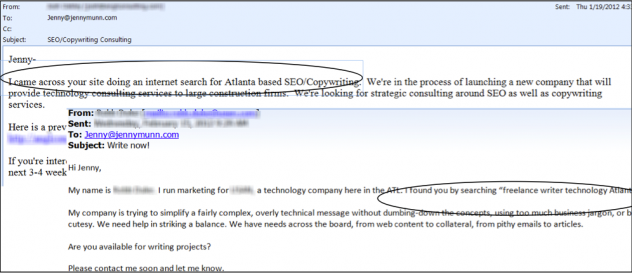I don’t quite remember when I stumbled upon commercial writing as a viable freelance profession, but as soon as I did I was sold. My background was in event marketing and sales, which I enjoyed but wasn’t necessarily passionate about.
I have always loved writing and I knew I wanted to do something using my business background, so combining the two was a natural fit. Although I didn’t have any professional training, I decided to make the leap to starting a freelance copywriting business in January 2010.
I did two things from the start that have been game changers for my business: first, I put up a website on WordPress, an incredible website content management system; second, I took the time to optimize my new site for the search engines (a.k.a. Search Engine Optimization or SEO), even though I really didn’t have any idea what I was doing at the time.
After getting my site up, I hit the pavement hard trying to land those first few clients. I networked like crazy, attending any free or low-cost event I could. I also spent a considerable amount of time reaching out to my network and getting involved on Twitter and LinkedIn. After a few short months, something interesting started happening. I started getting emails that looked like this:
Slowly but surely, SEO overtook networking as my #1 method of developing new business. Pretty soon I stopped going to networking events, slowed down my social media activity and stopped marketing almost entirely because I had so many projects lined up from clients who had found my website.
Now that 2 ½ years have passed since I started my freelance business, I’m astounded by how a small investment into learning and applying SEO has had such a profound effect on my business. Although most of my experience is positive, I do have some warnings about SEO, which I’ll share in a moment.
How I Optimized My Freelance Copywriting Website
I want to explain exactly how I used SEO effectively to drive traffic and prospects and ultimately convert web visitors into paying clients. I did the following six activities, which contributed to my current page-1 Google ranking:
1. Identified and selected my keywords using Google’s free keyword tool
2. Wrote keyword-rich title and description tags for my primary website pages
3. Blogged and kept blogging using my keywords a few times a month for the first two years
4. Promoted my blog posts on Twitter and LinkedIn
5. Learned to love Google Analytics as a way to see what keywords people used to find my site and other key metrics that helped me refine my strategy
6. Used WordPress to update my pages and keep my site fresh with new, timely content
7. Slowly started getting backlinks due to securing speaking gigs and workshops and through meeting other bloggers at networking events
The Effects SEO Has Had On My Business
While SEO has been incredible for my business, I’m the first to admit that it’s not for everyone. And despite its obvious benefits, I’ve allowed it to unfortunately limit my business. Here are my insights into the good, the bad and the downright ugly effects of SEO:
The Good:
• I rarely find myself in a bidding situation. For some reason, maybe because I’m on the first page of Google, when clients reach out to me they’re ready to do business immediately.
• I’ve met some incredible contacts through people finding my site: direct clients, referral partners (tons of website designers), marketing consultants, colleagues who recommended speaking gigs for me, fellow writers I’ve hired for overflow projects, and even an intern.
• Getting on the first page of Google happened very naturally for me by doing just the few simple, but consistent, activities I outlined above.
The Bad:
• SEO does not necessarily manifest the clients you want. Renowned copywriter Bob Bly has said that potential customers who find his website via SEO are never his best prospects; they require too much education, hand holding, and aren’t as willing to pay his fees as customers are who buy his information products or hear him speak at an event.
• SEO is not for everyone. Some copywriters might not need to spend time optimizing their site if they’re able to generate business through, for instance, books, speaking gigs, repeat clients, referrals, etc. Spending time optimizing their sites may not be the best investment if they’re staying busy thanks to other lead-generation efforts.
The Ugly:
• SEO has made me a very lazy business owner because I’m now used to prospects coming to me. It’s caused me to commit the cardinal sin of running a business: I have almost entirely stopped proactively marketing my business.
• SEO does not consistently bring me high paying prospects. It’s so easy to work with clients who approach me, I know I’m losing out on higher income clientele by not proactively pursuing those who might have more money or bigger projects. It’s rare that a corporate client will find me via SEO….most of the time my traffic is comprised of web designers with referrals, micro-business owners, service providers or solopreneurs.
• Ever since I landed in the top spot on the first page of Google, I have to work hard to maintain my ranking. It’s made me slightly obsessed with SEO since I have other business owners and freelancers constantly nipping at my heels for the top spot.
While SEO does have its downsides, the good has far outweighed the bad. Succeeding in SEO for my own site has led me to writing my first information product, garnered me a slew of speaking gigs, and might someday be a good niche for me, even though now I’m very much a generalist.
Weigh In On Your SEO Efforts…
What has held you back from getting started with SEO?
If you have taken the time to optimize your site, has your experience been similar to mine?
Any do’s and don’t’s you can share from your own experiences?

Jenny Munn is a passionate freelance copywriter in Atlanta who blogs about DIY SEO strategies for non-techies and small business owners. She’s the author of How to SEO Your Site: A DIY Guide for Small Business Owners, and offers a free keyword research report, 7 Simple Steps to Effective Keyword Research, at www.jennymunn.com.
Want to be a guest blogger on TWFW Blog? I welcome your contribution to the Well-Fed writing community! Check out the guidelines here.

